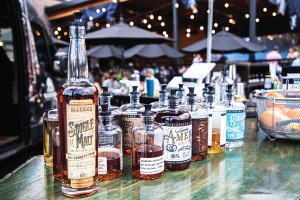Cuba Libre Celebrates A New Era In The Wake Of Castro’s Death
Some view him as a champion of the revolution. Others view him as a ruthless despot who brought the world to the brink of nuclear war.
Either way, if you are willing to recognize Fidel Castro’s death with political discussion (and say the words “Viva Cuba” to the bartender), Cuba Libre Restaurant & Rum Bar will reward you with a free rum and coke at Happy Hour during the nine days leading up to Castro’s funeral, between now and December 4. There will also be discounts on empanadas, ceviche and other signature tapas items. News coverage of Castro’s death will air throughout.
“A lot of Americans were too young at the time [of the height of Castro’s power],” said Guillermo Pernot, chef-partner at Cuba Libre. “You’d have to be 60 or older to remember it.” He hopes that this event will encourage young Americans to become more informed on the subject and to acknowledge the significance of opening relations between the United States and Cuba, which have been cold at best since Castro overthrew military dictator Fulgencio Batista in 1959. Castro had insisted that he bore no animosity towards America and that he wanted to establish a democratic state. Then he executed his political opponents, seized privately-owned agricultural land, turned to the Soviet Union for economic support and thus established the first communist state in the western hemisphere.
And so began the hostility between America and Castro. In 1960, President Eisenhower imposed a trade embargo on Cuba as he believed the nation’s economic alliance with the Soviet Union was a threat to the United States. In 1961, 1,500 Cuban exiles returned from America to invade the Bay of Pigs in a poorly-planned attack. Most invaders were captured or killed, and Castro was able to exploit this embarrassing failure for the rest of his life. Then, in 1962, American spy planes discovered that the Soviet Union had built a missile base on Cuba. President Kennedy ordered military forces to be on alert and imposed a naval blockade of the island. For thirteen days, the world remained there, on the brink of war. Only after the United States agreed to remove its missiles from Turkey and not to invade Cuba did the Soviets withdraw their missiles and dismantle their bases. Over the next five decades, this hostility and mistrust would continue.
In the immediate aftermath of the revolution, a quarter of a million of the six million people that comprised the Cuban population left the country–many for America, which, combined with the number of Castro’s exiles who flocked here might explain why so many outright celebrations of his death are taking place in this country. They had discovered that Castro’s financial policies did not benefit them. Those who stayed began to resent him too as he did not keep his promise to hold free elections and seemed mad with power. The state controlled every news outlet, restricted internet access and jailed citizens for the unspecific crime of “social dangerousness.”
Still, many Cubans, though somewhat disillusioned, remained faithful to Castro. And while he has supporters and detractors all over the world, he is nonetheless remembered as one of the greatest revolutionaries of all time. After graduating from law school, he took on cases for the poor pro bono. He fought a vicious tyrant with inferior weaponry and superior rhetoric and charisma. After seizing power, he reduced rent for low paid workers, abolished segregation laws, closed down casinos and nightclubs and made free education and health services available to all Cubans.
Castro ruled until 2008, when he fell ill with diverticulitis and handed power to his brother, Raúl Castro, who has plans to resign in 2018. A great–if not exactly benevolent–revolutionary, Castro remains one of the most influential and controversial figures of the past five decades. “People having a drink are more open to having a conversation about certain taboos when they wouldn’t be in other situations,” said Pernot. He hopes the incentive of a free drink will encourage people to remember the man and revolutionary–whether with derision, admiration or skepticism–with a conversation over drinks. “We are not celebrating his death,” said Pernot. “It is inhumane to celebrate the death of a human being. We are commemorating the end of an era in Cuba and the beginning of a new one.”
Where: 10 South 2nd Street
When: Saturday November 26th – Sunday December 4th, 5–7 p.m.
Cuba Libre [f8b8z]


